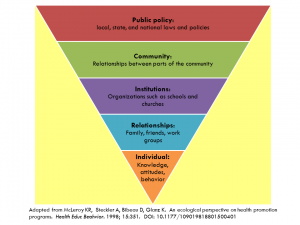by Aimee Coombs, University of Massachusetts Lowell
Image credit: https://shaketheworldforchange.wordpress.com/2014/06/04/introduction-to-the-project/
Individuals working in the field of community psychology should approach their work, within a community, with different strategies and perspectives to gain a holistic understanding of the community they’re working with. One particular perspective is the ecological approach which allows the community psychologist to understand how the intricate ways of different parts of the community affect oneanother. Understanding the interdependence that each system has, and how each part of the system affects the other, can serve as a guide in determining practices and interventions that may be used or implemented to help serve the community.
Having the broader perspective of a community allows for a community psychologist to identify the multiple parts, and relationships, within a social system that are in need of assistance and those that will be reinforced. Failing to have a broad view of the community could lead to key areas of the social system that are in need of assistance to be overlooked and neglected, which in turn will inadvertently lead to the interventions implemented to fail. An example of an ecological perspective offered by Scott & Wolff (2015), is the issue of global warming being caused by carbon dioxide. Looking at carbon dioxide as the sole reason for global warming fails to encompass the whole picture of the entire system that contributes to this problem. One needs to consider the effects that society imposes on the earth and adopt solutions that would incorporate the total social system to bring about changes that would lower carbon dioxide emissions to levels that would resolve the issue of global warming. Looking at the problem from just the standpoint of carbon dioxide levels being too high, fails to understand all the components that contribute to the problem and without considering those components, appropriate solutions to the problem will not be implemented.
Some ideas to consider in helping to develop an ecological perspective are:
- Develop an awareness of the social connection within a community and its members. Knowing how the community is interdependent on each other can help guide a community psychologist in working with the members and developing a working relationship that will lead to solutions to the community’s issues.
- Assuring that those in the community who have been disregarded by other members are given a voice and that they are “recycled” by being trained for their new roles in the community.
- Create feedback loops to help determine whether an intervention is working or not. Having these feedback loops helps give members of the community an opportunity to voice if the impact of the intervention is having a positive or negative effect within the community. Feedback loops help make a community more adaptable and sustainable (Scott & Wolfe, 2015).
- Encourage diversity within the community. Diversity offers many perspectives that help brainstorming solutions to resolve issues in the community.
- Promote a balanced leadership model by having an appropriate balance of hierarchal and communal processes (Stone & Wolfe, 2015).
Community psychologists who incorporate these ideas into their practice will develop an ecological perspective that will help them acquire the ability to see the whole social structure that contributes to the issues of the community. Having this skill will better serve the community when confronted with issues that are in need of resolution and an ecological lens is needed to determine the solutions that will bring about positive change.
#commpsych
Aimee Coombs is a graduate student in the Autism Studies program at the University of Massachusetts Lowell.
References
Scott, V. & Wolfe, S.M. (2015). Community Psychology Foundations for Practice. United States of America: SAGE.

